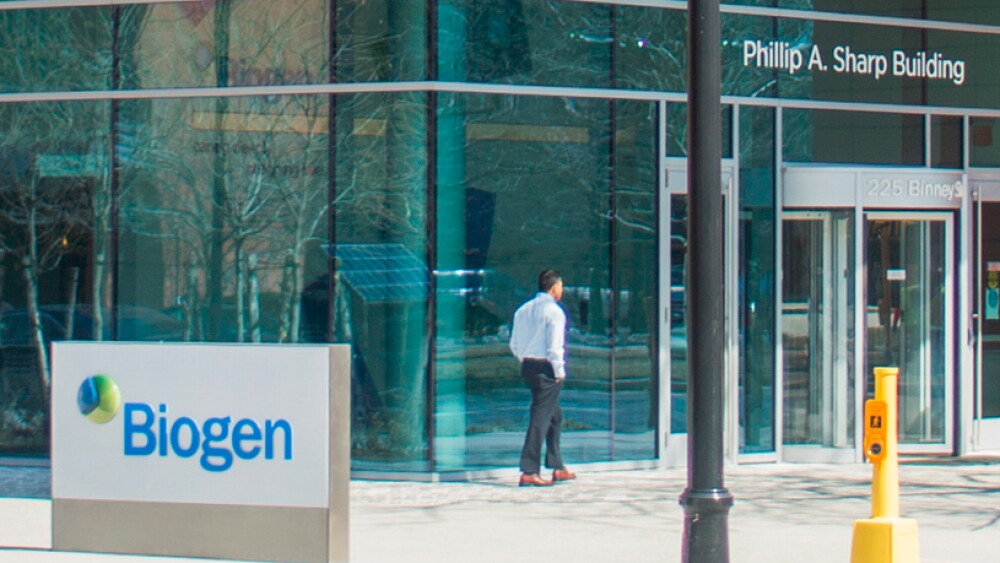September 6, 2016
By Mark Terry, BioSpace.com Breaking News Staff
Cambridge, Massachusetts – Biogen is often rumored to be either an acquisition target or planning to buy up some company. To date, they have both tended to be just that, rumors. George Budwell, writing for The Motley Fool, takes a hard and clear-eyed look at Biogen, pondering whether the company is a worthwhile takeover target.
The first question, on a practical basis, is how strong the company’s finances are. Generally speaking, Biogen is just fine in that regard. At the company’s second quarter results, total revenues were $2.9 billion, up 12 percent compared to the same period in 2016. It was primarily driven by global revenues from its multiple sclerosis (MS) and hemophilia products. Its MS leader, Tecfidera, brought in $987 million in the quarter, an increase over the first quarter’s $946 million. Its two hemophilia medications, Electate and Alprolix, brought in $125 million and $80 million, respectively.
Budwell notes that the company only has $6.54 billion in debt, 12-month trailing free cash flows of about $4 billion, and is projecting top line growth for next year of 3.4 percent. Otherwise, in terms of financials, the problem is price. It has a current market cap of $67 billion. Budwell writes, “Biogen sits in the meaty middle of its peer group in terms of its forward P/E ratio. The biotech also doesn’t have nearly the amount of leverage on its balance sheet as most of its fellow biopharma, with a debt-to-equity ratio of only 57.4 percent, perhaps adding yet another layer of value for potential suitors.”
So on the plus side, Biogen dominates the MS market. Sales were expected to slow down partially as a result of a loose link to a rare, fatal brain infection, sales are still growing. Budwell notes that its bigger weakness is a high-risk clinical pipeline focused on central nervous system (CNS) drugs. That is certainly true. In particular, Biogen is swinging for the fences with its Alzheimer’s drug, aducanumab. Since Alzheimer’s drug development is a wasteland of failed drug trials, anyone really working in the field is, pretty much by definition, in a high-risk arena. On the other hand, even a modestly successful drug, if approved, would likely become a blockbuster.
In June, another one of Biogen’s high-risk shots, opicinumab (anti-LINGO-1) to repair the nerve damage caused by MS, failed in a Phase II clinical trial. The company lost $8 billion in market value overnight as a result. Interestingly, although not much has been said about it, Biogen hinted that “evidence of a clinical effect with a complex, unexpected dose-response was observed.” Maybe there’s still hope for the drug for something, but it’s not clear if anyone would consider buying the company on the basis of that.
Aducanumab, on the other hand, has shown some promise for Alzheimer’s, including cutting amyloid-beta plaque from the brain. Budwell seems to be riding both sides of the fence here, saying, “Aducanumab does appear to be well worth the risk, as the Street thinks that an effective Alzheimer’s treatment that’s truly disease-modifying could generate an astounding $20 billion in peak sales.” But he later says, “After all, aducanumab, while intriguing from a peak sales perspective, is more likely than not going to fail in its ongoing late-stage trials if history is any guide.” The glass is, apparently, half-full and half-empty at the same time.
Still, Budwell thinks it’s a real possibility that Allergan or Merck might take a shot at Biogen. Allergan, he writes, “doesn’t seem overly concerned with internal prospects for research and development, but rather the impact an acquisition has on its bottom line. In that sense, an Allergan-Biogen pairing may make sense. Merck, for its part, has made a number of questionable tender offers in the recent past in an attempt to reinvigorate its top line, meaning that it’s not inconceivable for the drugmaker to take a similar approach with Biogen.”





